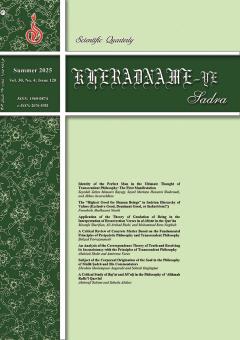A Critical Study of Rajʻat and Miʻrāj in the Philosophy of ‘Allāmah Rafīe’ī Qazvīnī
Subject Areas : ملاصدراپژوهی و اندیشۀ حکمت متعالیه
Abdul Rafi Rahimi
1
![]() ,
Sohila Alidost
2
,
Sohila Alidost
2
![]()
1 - Associate Professor, History Department, Imam Khomeini International University, Qazvin, Iran
2 - PhD Candidate of History of Post-Islamic Iran, Imam Khomeini International University, Qazvin, Iran
Keywords: rajʻat, Miʻrāj, soul, perpetual constraint, ‘Allāmah Rafīe’ī ,
Abstract :
The bodily return of a group of humans to the material world in the era of the advent of Imām Mahdī (‘a) and before the Day of Judgment is known as “rajʻat (return),” and the bodily journey of the Prophet (ṣ) during his lifetime to the immaterial world is known as “Miʻrāj” (ascension). Some thinkers and scholars of the Islamic world reject rajʻat and consider its occurrence impossible; another group accept it without discussing its quality, and some seek to prove it using some rational arguments. The issue of Miʻrāj, however, is agreed upon by most Islamic thinkers, yet they differ on the way of its occurrence. ‘Allāmah Rafīe’ī Qazvīnī is one of the thinkers who has delved into the topics of rajʻat and Miʻrāj and was able to answer some of the questions following a rational approach. In this research, using a descriptive-analytical method and library resources, the authors have tried to answer the question of with which argument ‘Allāmah Rafīe’ī managed to demonstrate the occurrence of rajʻat and the physicality of miʻrāj. The findings of the study indicate that he emphasizes the corporeal occurrence of rajʻat through three rational premises: the soul's attachment to the material body, the necessity of the manifestation of the existential feature of the Prophet (ṣ) and the People of the House (‘a), and the impossibility of perpetual constraint. Regarding the discussion of Miʻrāj, he also believes in the corporeal and spiritual journey of the Prophet (ṣ) to the realm of dominion and has tried to prove it based on certain philosophical and rational principles.
قرآن کریم.
ابن¬سینا (1366) معراجنامه، به انضمام تحریر آن از شمسالدین ابراهیم ابرقوهی، تصحیح نجیب مایل هروی، مشهد: آستان قدس رضوی.
ابنمنظور، محمدبن مکرم (1335) لسان العرب، بیروت: دار الصادر.
اردستانی، محمدعلی (1388) رفعت حکمت، تهران: پژوهشگاه فرهنگ و اندیشه اسلامی.
بهار، مهرداد (1380) بندهش، تهران: طوس.
حر عاملی، محمدحسن (1380) الایقاظ من الهجعه، ترجمۀ احمد جنتی، تهران: نوید.
رضوی، رسول؛ دارینی، رضا (1396) «واکنش متکلمان در برابر چالشهای برخاسته از هیئت بطلمیوسی»، نشریه کلام اسلامی، شمارة 103، ص145ـ128.
رفیعی قزوینی، سیدابوالحسن (1368) رجعت و معراج، بکوشش محمدرضا بندرچی، قزوین: طه.
رفیعی قزوینی، سیدابوالحسن (1376) غوصی در بحر معرفت، تهران: نشر اسلام.
شیخ مفید (1388) الارشاد، ترجمة امیر خان بلوکی، قم: تهذیب.
شیخ مفید (1390) اوائل المقالات فی المذاهب و المختارات، ترجمة طاهره عظیمزاده طهرانی و صدیقه اشرف، مشهد: سخن گستر.
صمدیه، مریم؛ حسامی¬فر، عبدالرزاق (1402) «تحلیلی از معراج پیامبر گرامی اسلام بر اساس مبانی فلسفی ابن-سینا و ملاصدرا»، خردنامه صدرا، شمارۀ 111، ص40ـ27.
طباطبایی، سیدمحمدحسین (1367) تفسیر المیزان، ترجمۀ محمدباقر موسوی همدانی، قم: دار العلم.
علوی عاملی، سیدمحمداشرف (1381) علاقة التجرید، ج1، تهران: انجمن آثار و مفاخر فرهنگی.
کلینی، یعقوببن اسحاق (1393) روضه کافی، ج۲، ترجمۀ محمدباقر کمرهای، تهران: اسلامیه.
کوهن، آبراهام (1390) گنجینهای از تلمود، ترجمۀ امیر فریدون گرگانی، تهران: اساطیر.
مجلسی، محمدباقر (1392) بحار الانوار، اصفهان: مرکز تحقیقات رایانهیی قائمیه.
مجلسی، محمدباقر (1390) کتاب رجعت، ترجمۀ سیدحسن موسوی، تهران: دلیل ما.
محمدی، بهزاد (1394) «فلسفه رجعت از منظر آیتالله شاهآبادی»، اندیشه نوین دینی، شمارة 41، ص98ـ81.
مطهری، مرتضی (1389) مجموعه آثار، ج4، قم: صدرا.
مظفر، محمدرضا (1380) عقاید الامامیه، ج1، ترجمة زینالعابدین کاظمی خلخالی، قم: نشر حضور.
موسوی، سیدحسن (1394) مکاشفه، تهران: رضوی.


